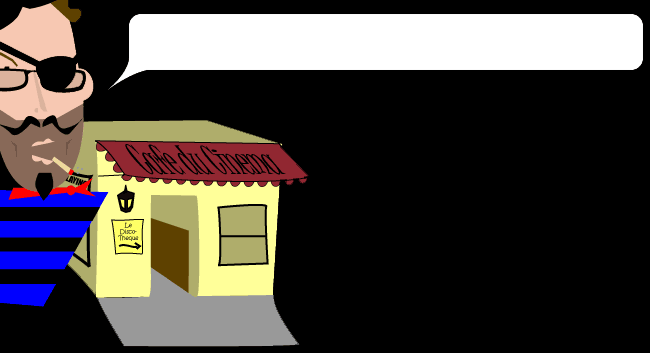by Jim.
So, you've read part one of this series and now you're brimming with ideas - here's a quick guide to some things you will need to consider before donning your beret. Any and all of these require a greater deal of attention and will accordingly be given their respective "breakout articles" in months to come - need I mention that all are invited to contribute where you feel you have some experience - didn't think so.
Story
Oh, right... a story. Keep it simple this first time out. You might even want to shoot themes or emotions - try to bring across something as simple as 'terror' to your audience (not so simple, after all, eh?) Your first few films should be about exploring visual narrative, transferring ideas and emotions to your audience through composition and editing. Once you've cut your teeth on the particulars of your camera, to say nothing of the post-production process, then start to knit together a more robust emotional fabric.
As things turn more ambitious, when you look towards writing a feature, let's face it -- what am I going to tell you that Irwin Blacker or ol' Robert "T.J." McKee haven't said better?
Money
...and how to get it. Hmm... have any rich, old relatives? Make sure that you're in The Will, and the next time you're out eating, try to get them laughing while in the middle of ingesting some solid food. As their eyes widen when the last gasps of their life sigh out from around the chunk of Chicken Cordon Bleu lodged in their pyloric sphincter, remember that it was for a worthy cause!
So maybe you lack the sort of moral flexibility that such an idea demands -- I've never shied away from a little hard work. Maybe it's the Irish in me, but I find as long as I can stand, there's a legit way to make money. I've personally signed a deal with the Devil and through working in the restaurant biz, I get to live in the relative state of opulence that surrounds me at the moment. In Ariana's words - "You're the first artist I've met who has a Primary Care Provider."
All the same, there are ways of working smarter for the green. When you find them out, be sure to tell me. Hah! But seriously... what you need first, as I'm beginning to understand, is a sponsor (or "fiscal conduit," as they're now known.) This person should have a fairly competent business acumen, to say the least, but moreover they need to be enthusiastic about your work and preferably able to convey that enthusiasm to others.
Figure out your audience, too, and this will help you seek out funding. If it's a touching personal story on a social issue like physical abuse or racism, seek out people who are affiliated with organizations dealing with the topic. Use your head - look around you and get a feel for what is lacking or a feel for what people want and figure out a way to target either.
Format
Now you have to consider what is perhaps the most important decision in the pre-production process - what format to shoot on. For the low/no-budget indie there are really a handful of choices - 8, Super 8 or 16mm film, and... digital video. When considering your options, you should become acquainted with the Logic 101 terms sufficient versus necessary. At comparable price-points, film generally offers a greater color palette, higher resolution and more accurately renders highlights and shadows - in other words, as one might gather from my article on the subject, film is in general the image king, for now. But grab a hold of a digital video camera - say, the Canon XL1 - and decide for yourself whether or not the difference that film offers is necessary to realize your vision, or that digital video's resolution and color palette are sufficient.
At every step of the game, film is more costly, more complex, and in general, more of a pain in the ass. To reiterate, yes, it still looks more attractive and in general plays to a larger audience - but that doesn't mean that you can't shoot in digital video and up to film for wider release as readily as you would shoot film and telecine to digital video to make the editing process easier. The former of these two considerations requires, REQUIRES that you know how to capture video in a way that maximizes image quality. Some tips - I'm pretty sure you should keep your finger off the zoom button and if at all possible don't whip your five pound camera around with the reckless abandon. Sarcasm aside, let's say you're not a digital video DP with, oh, 5 years under your belt - don't let that deter you, crack open yet another book and get learning how the pro's do it. On that note, this might prove to be invaluable.
The Look
I'm not talking the film look - I'm talking your own personal image. I kind of dig the "artist" look - slighty unshaven (not for the girls reading this), comfortable shoes, jeans, a t-shirt and possibly The Flannel. Of course, this is almost the cliché "artiste" image, so maybe you should give it a new spin. I'm kinda thinking I'm going to do the Hitchcock suit thing, but it would be uber to do the suit thing if I could get the rest of the crew to go in on it with me - matching suits, sunglasses and briefcases - maybe even don the hardcore Wallstreet attitude vis a vis "Lunch is for wimps," with a dash of Jay Mohr's "I'm the fucking Terminator!"
So... who's with me? Let's make a damn movie already...
back.
